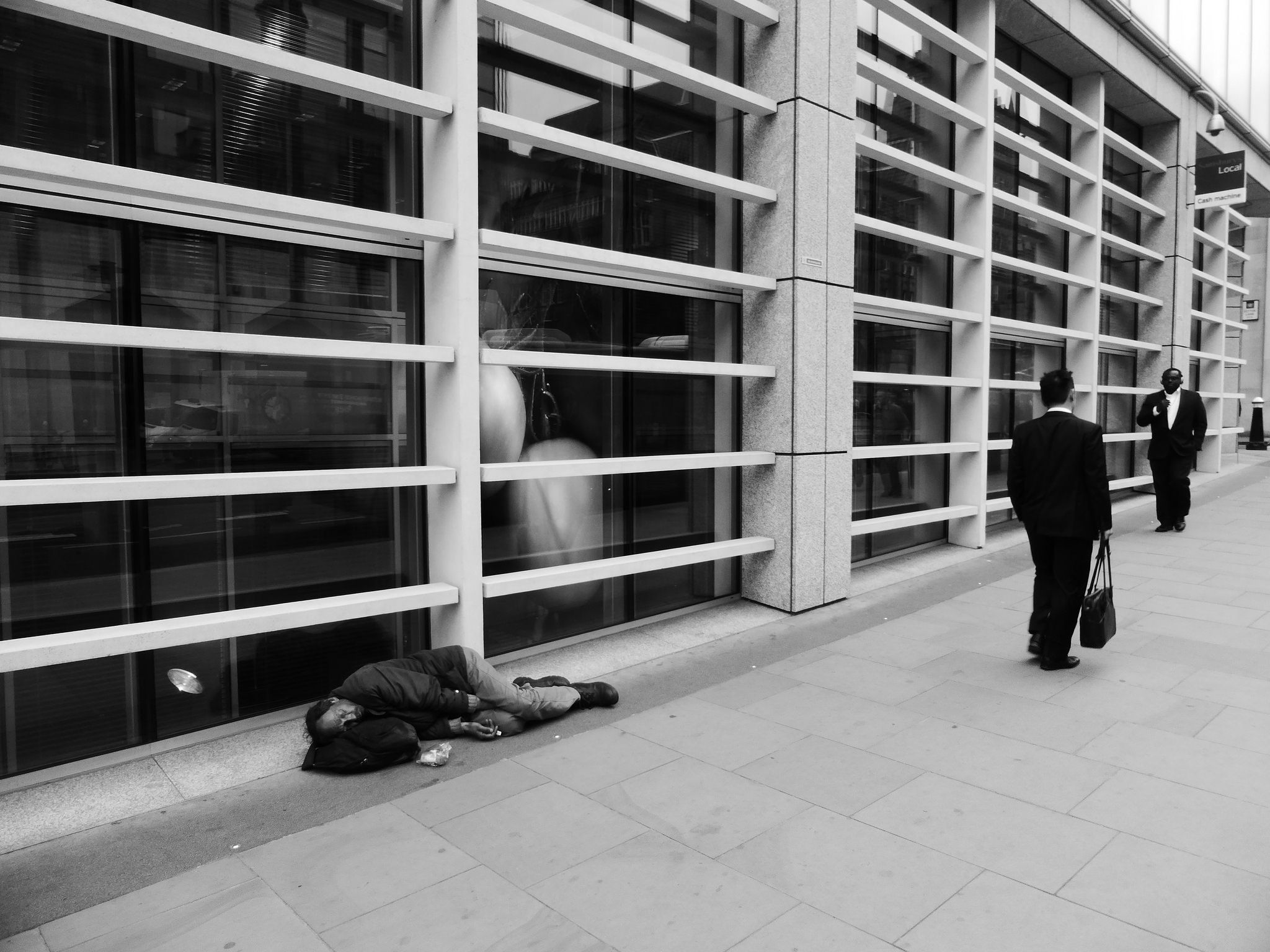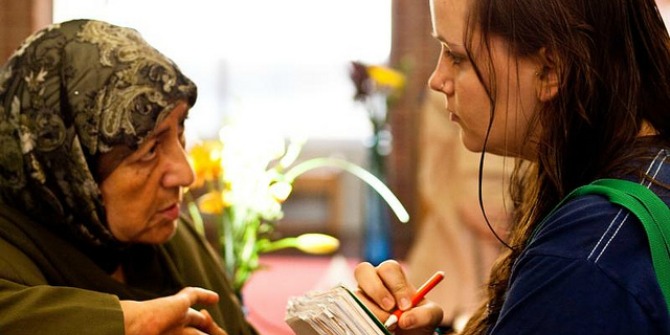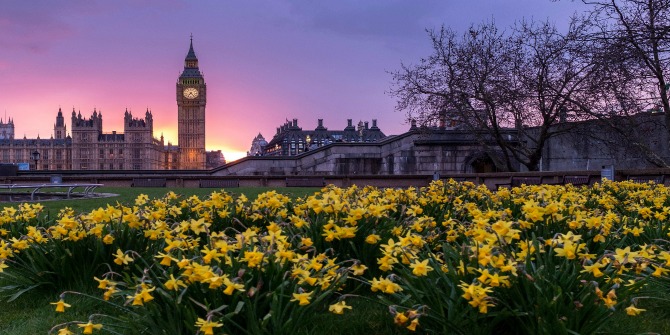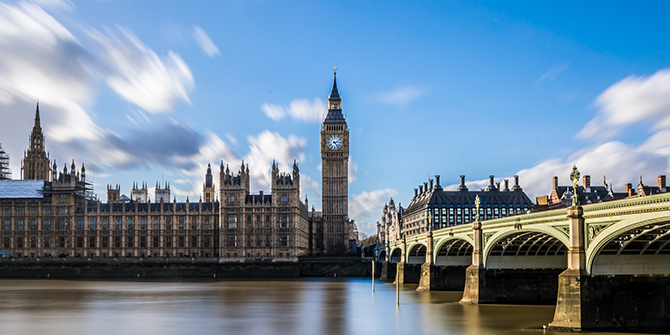 Drawing on multiple sources of evidence, Danny Dorling dissects the reasons why the UK is set to become the most unequal of the 25 richest countries. He writes that behind every unequal policy, there is a lack of empathy, and only kindness and respect will enable us to see each other as if we really are “all in this together”, and turn the tide.
Drawing on multiple sources of evidence, Danny Dorling dissects the reasons why the UK is set to become the most unequal of the 25 richest countries. He writes that behind every unequal policy, there is a lack of empathy, and only kindness and respect will enable us to see each other as if we really are “all in this together”, and turn the tide.
The Conservatives won a narrow majority in May 2015. The result shocked a London based commentariat. This was hardly surprising as the Capital swung to Labour and London remains where life’s winners congregate, a place from where losers must be expelled. It was life’s losers who did not turn out to vote for the main alternative on offer, a watered-down version of Conservative austerity being sold to them by Ed Miliband. We were then told that the Labour Party did not appeal enough to those who were aspirational and wanted more, including people who wanted more largely irrespective of who had to have less. But perhaps fear and fantasy greatly appealed too, an eighth of the English electorate voted for the UK Independence party (UKIP).
In Scotland all but three of the constituencies fell to the Scottish National Party (SNP) which now represented as wide a cross-section of society as it is possible to imagine. The former Royal Bank of Scotland oil economist, Alex Salmond became an MP alongside young students and aged socialists. So 56 SNP MPs set off to London to take their seats and spread their message. Not since 1918, when Sinn Féin took 73 seats in Ireland, has a third party performed so well in the United Kingdom. This must be seen as a signal that a change is underway, but for many among the English elite, the Scots bring to mind restless children.
As the realisation of what had dawned in May 2015 spread, new voices began to grow louder and be heard for the first time in England. They said the Labour Party’s issues were not about choosing the wrong leader or having the wrong electoral strategy, but that Labour had forgotten how to cooperate and be kind. Labour did not cooperate with the Greens, with the SNP, nor even much with each other in the Shadow Cabinet. Instead, Labour saw the election as a two-horse-race where winning alone was all-important.
 Credit: duncan c CC BY-NC 2.0
Credit: duncan c CC BY-NC 2.0
In the days immediately after that May election a sharper mood emerged among many of those who in so many different ways oppose the power of the 1 per cent. Rebecca Winson, a writer and an activist for GMB Young London, wrote on the day after the election: “Labour, Green, Tusc [Trade Union and Socialist Coalition] and even Lib Dem progressives must work together to oppose what’s going to happen. We’re all on the same side now.” She ended her piece by saying:
“If you can, be kind to those you argue with, because compassion changes more minds than anger, even though it’s harder to muster. Be kind to the poor, the disabled, the immigrants, the workers and to anyone who’s a bit different. The government won’t be, you see.”
The day before the election it was revealed that the Coalition government’s Department for Work and Pensions (DWP) had conducted 49 reviews of benefit-related deaths. Many of those deaths had probably been recorded as suicides, but some could have been deaths from starvation. We have no way of knowing as the DWP refused to release the information leading to an investigation from the information watchdog. Those 49 are a tiny sample of all the deaths thought to have been related to the ways benefits for the very poorest in the UK have been withdrawn since the coalition government took power in 2010.
The list of names of all those thought to have died due to government callousness is long. Between 2010 and 2013 there had been many thousands of deaths of working-age people in the days and weeks after they had their benefits withdrawn. During 2013 and 2014 the numbers rose further and the lists of names grew longer. Those lists do not even start to include all the elderly who have died earlier than they otherwise would.
In 2012 1,046,398 sanctions were applied to people who were claiming Jobseeker’s Allowance. The minuscule weekly income of the very poorest people in Britain was being docked, almost always for a tiny minor misdemeanour. These misdemeanours included not attending a meeting in a Jobseeker office because the claimant was attending an interview for an actual job elsewhere. A further 32,128 people just surviving on the Employment and Support Allowance (because they were not working due to illness or disability) had their monies cut for some similar infringement. On top of this a further 44,000 lone parents receiving Income Support, because they had little or no other income, were sanctioned during that year and lost monies they needed to prevent them and their children going hungry for indeterminate stretches of time. Lives were destroyed, people were shamed, and atrocities were being committed.
We have no record of how many children were harmed by the 1.1 million financial sanctions applied in just one year to Britain’s poorest families. Every single one of these families was already living on less than the Minimum Income Standard for the UK. We know that because benefit levels in Britain remain pegged far below the level that the British public agree no one should fall below, and are falling further below that year by year. What we do know about the scale of mass sanctions is largely a result of the tireless research carried out by David Webster of the University of Glasgow who commented that: “Decisions on guilt are made in secret by officials who have no independent responsibility to act lawfully. Yet the ‘transgressions’ (DWP’s own word), which are punished by this system, are almost exclusively very minor matters”.
David noted that over the same period of that year in which 1.1 million sanctions were applied all the Magistrates’ and Sheriff courts of Great Britain, even when combined, imposed a total of only 849,000 fines on people. All the fines for the people found to be criminals and prosecuted in these courts totalled far less money (even per criminal) than the average sanction handed out to those just struggling to get by.
The failure to make as many job applications as their nominated advisor demanded in a week receives a harsher punishment for the benefits claimant than shoplifting. It then results in shoplifting as people have to eat. Even taking out-of-date food from supermarket waste-bins counts as shoplifting today.
It’s easy to make cuts if you don’t sympathise and it is easier not to sympathise if you are protected from the cuts and they don’t immediately affect you. The income of the 1 per cent has been protected whilst incomes and benefits for the poorest have been slashed and sanctioned. At the same time there have been huge cuts to local authority budgets (with more to come) and the subsequent massive cuts in services for the most vulnerable – to social care, youth services, mental health services – whilst the 1 per cent, and indeed many others, are largely unaffected by these sorts of cuts. They already use private services for care, to try to deal with their and their children’s poor mental health, for their education and their insurance.
It is telling to look at whose incomes and state services have been cut the most. This allows us to see who is least valued by those in power. Since 2010 some 79 per cent of all cuts have fallen on the heads of women. That high proportion is partly due to women most often being the lone parent in lone parent families, as well as the cuts to services being to those services used more often by women. In addition a disproportionate number of women who were working in public services have lost their jobs or been made to go part-time.
In 2012 an estimated 3.5 million children were living in poverty. In 2013 the Fawcett Society estimated that a total of £14.9 billion had been cut from benefits, tax credits, pay and pensions, with 74 per cent of this being taken from women’s incomes. By 2014 they also found that the inequality gap between women and men was actually rising. Data from 2014 showed that two thirds of all the welfare cuts in Scotland have come from families with children. Lone parents have lost £1800 a year, £400 more than families with two parents and more resources. But the cuts have been even deeper for the disabled, some £2000 a year reduction in their income, on average.
Because the UK government hid and delayed the publication of the statistics, academic researchers in England have been forced to use data passed to the European Statistical Office. That data shows that George Osborne mislead parliament in his March 2015 claim when he said that people were better-off than they had been in 2010. Data collected across the whole of the UK actually revealed that living standards had fallen for all but the very richest. Increasing numbers of people have been reporting falling behind with their rent and that they are struggling to pay fuel bills. Almost half the population cannot now afford to immediately repair or replace their fridge or cooker if it breaks down. “Only the very richest (those who could make ends meet very easily) saw no perceived fall in their living standards.”
Living in a society that tolerates gross wealth and income inequalities makes it hard to empathize with a wide range of other people. The very rich may ignore you in the same way that you sometimes don’t notice the person sweeping the street as you walk by. Or the very rich try not to notice you – just as you might have learnt to try not to notice the people sleeping rough in the entrance to the tube or train or bus station. You are as far down, and your life as frightening to the very rich, as the thought of being roofless will be to you.
When you cannot empathise with another group, it is very hard to think kindly towards them. It is when you feel “all in it together” or at least “there but for the grace of God, go I” that kindness comes more naturally. And it comes less and less easily in the UK. The UK is on a trajectory to become the most unequal of the richest 25 nations in the world. Those in power in the most unequal of rich countries today see kindness as weakness. Had they been kinder, less aggressive, when they were younger and making their way in the world, they would probably not have got to where they are today – they tell themselves.
Kindness is a tendency to be shunned and derided by those currently in power. Violence, action, force and what they call ‘civility’ is what is needed. Kindness does not help the poor, they say, and instead they offer the ‘tough love’ of sanctions.
There was a time when hardly anyone was roofless in the UK, when you never met a beggar and when those with least were not that different from those in the middle, when those with least had enough to be included in society. I was young then. As I age it becomes harder to remember when I first saw teenagers having to sleep rough, or was first asked for ‘the price of a cup of tea’, or first realized that because I could make some choices whereas others couldn’t, that they were no longer free.
Luckily you don’t have to rely on the memories of the old to know that a more equal world is possible, a world where the 1 per cent take a far smaller share of the cake. The 1 per cent, by definition, will always be those taking the largest slice, but not always such a great fat slice, leaving slithers for the rest. Question those who say that it can only be this way. Try to question them kindly rather than with incredulity. A society based on merit would be remarkably equitable compared with what we face today. No one is worth 3,000 times another person. The three-thousand fold inequalities within the 1 per cent are just as indefensible as those between them and the other 99 per cent.
A slow revolution means you are in it for the long haul. But it will be worth it when finally we begin to create a more equal country for all because the next generation and those that follow them will not have to grow up in a world of ignorant untruths including that only a few of them are truly able and the rest are largely worthless commodities – or people only having a very low wage value.
It will be worth it if we turn the tide because, even if we do not care that much, in our old age people who have the time and peace of mind will care for us, not least because we cared for them when they were younger. It will be worth it because we will know that it could have been much worse had we stood by and done nothing unselfish.
Gross inequality creates a lack of respect for the other group – people who are not like us. There is a lack of respect among the rich for the poor, and that will be the same among the poor for the rich. Lack of respect breeds cruelty and hate. Lack of respect is not new and has grown between groups many times before, over religion, race, nationality, social class, sex and sexuality. These older divisions all remain and can be easily reignited, resulting in cruelty and hate, fear, suffering and despair. However, nowadays it is financial inequality both globally and in the UK that is the greatest source of our separation from each other.
What is needed is understanding and generosity, hope and perseverance, but above all kindness. Kindness is patient, it does not envy, it does not boast, it is not proud, it is not self-seeking (1 Corinthians 13, verses 4-8). All is worthwhile when we have been kind.
—
Please note: this article was originally posted on the Policy and Politics Journal blog and was also crossposted on Democratic Audit UK. It was adapted by Sarah Brown from Danny Dorling’s 2nd edition of Inequality in the UK and the 1% with his kind permission.
_
About the Author
 Danny Dorling is is the Halford Mackinder Professor of Geography of the School of Geography and the Environment of the University of Oxford
Danny Dorling is is the Halford Mackinder Professor of Geography of the School of Geography and the Environment of the University of Oxford
Featured image credit: Bada Bing CC BY-NC-SA 2.0








Its only a matter of time before the poor say enough is enough rise and bit the head off these governments and corporations its kinda happening now just look at Brexit.
A brilliant piece. There is so much fantastic writing on inequality we need to seriously translate this into political action. I have read Danny’s work and a range of other work on economic inequality. As I often quote Goran Therborn : “The Killing Fields of Inequality” he too writes about the the wider the wealth gap “distanciation” the harsher the public policy This is particularly the case for the UK where our current government , and the political elite more generally, are drawn from the upper end of the wealth scale. I particularly like the repeated use of the word “kindness”.. Let us bring it back into centrality in public policy.
Thank you.
No one has ever said one person is worth 3,000 times another person – one person’s *labour* is worth 3000 times another person’s.
Society needs urgently to find a way to share wealth without so much of it ending up in hands of the wealth redistribution profiteers
http://perkurowski.blogspot.com/2016/01/i-fight-against-inequality-on-side-of.html